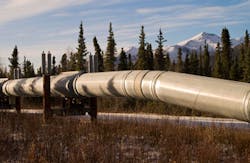Keystone XL draft assessment seen as positive sign for oil industry
The U.S. State Department has said it has no major objections to the Keystone XL oil pipeline and noted that other options to get the oil from Canada to U.S. Gulf Coast refineries might be worse for climate change. However, its draft assessment of the project did not actually recommend that the Keystone XL pipeline should be built, while a State Department official warned that the report was a work in progress, according to Bloomberg.
Despite the cautious assessment, it was regarded as a win for oil executives, who believe the report was a hint that the Obama administration would approve the controversial project that has turned into a landmark clash between economic growth and the environment.
According to the report, Canada's tar sands are likely to be developed, regardless of whether the United States approves Keystone XL — a pipeline that is planned to carry oil from western Canada to refineries in Texas. The pipeline would go through Montana, South Dakota, Kansas, Nebraska and Oklahoma. Even though the report acknowledged the fact that developing tar sands in Alberta would cause significant greenhouse gases emissions, it pointed out that other methods to transport the oil, including rail, trucks and barges, were also a threat to the environment.
RELATED: Obama pledges to cut red tape in oil and gas drilling approvals
The analysis by the State Department looked at two options using rail for the first time — shipping the oil on trains to existing pipelines or to oil tankers. It estimated that those alternative methods would release greenhouse gases that would contribute to global warming more than the construction and operation of the pipeline would. The Keystone XL pipeline, according to the report, would release annually the equivalent of global warming pollution that would be produced by 626,000 passenger cars. By comparison, moving the oil on trains to mostly existing pipelines would release eight percent more greenhouse gases such as carbon dioxide than Keystone XL.
In Canada, reactions to the report have been similarly cautious but still positive. Keystone XL's operator, TransCanada, said that the draft analysis is a step closer to getting the green light for the project, after years spent developing it and lobbying in the United States. The pipeline is designed to have a capacity of 830,000 barrels a day of tar sands fuel to be carried from Alberta and oil from shale rock formations to refineries in Texas.
Meanwhile, Bloomberg noted that environmentalists see the decision on Keystone XL as a test of the Obama administration on regarding its commitment to making climate change a priority in its second term, as the president claimed in his inauguration speech. The administration is also expected to release final rules that would restrict greenhouse gases on new power plants for the first time, which would mean that the Environmental Protection Agency would have to deal with legal and political pressure to issue standards for existing plants. Meanwhile, the government is reported to be considering regulations regarding fracking, which has led to an energy production revolution in the United States but has also raised concerns about air and water pollution.
